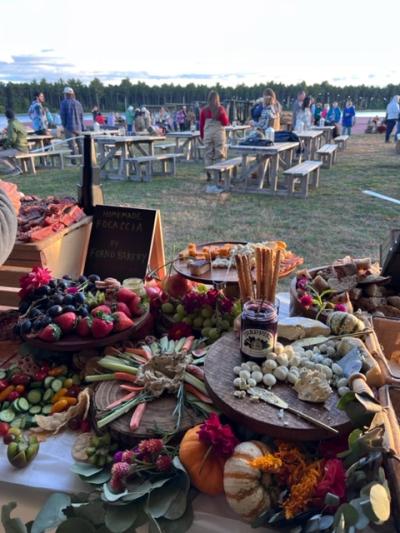In a sea of red under a sky of pink, people gather to promote food security
Standing in a flooded cranberry bog under a bright pink night sky illuminated by the northern lights, local people gathered in support of the Marion Institute's Frogfoot Farm-Neighbors Feeding Neighbors program at the 2nd annual Boogie at the Bog event.
The event was held Thursday, Oct. 10 at the A.D. Makepeace Company headquarters, more specifically in their cranberry bogs,. People experienced all kinds of local foods in support of the Marion Institute and their food relief program at the Plymouth-based Frogfoot Farm-Neighbors Feeding Neighbors.
The Boogie at the Bog event is a fundraiser to help support the farm's mission of increasing access to fresh food across the South Coast.
"You take a mile and a half trolley down a dirt road where it opens up to a big field of cranberry bogs," said Marion Institute Executive Director Liz Wiley. "There is an opportunity for our guests to put on waders and get a cocktail and have cocktail hour in the bog of floating cranberries."
Wiley added there are many local food vendors that set up a stand outside the bog for the event. Some of the options this year included local oysters, lobster rolls and many more locally sourced options.
Celebrating local food is not only the mission of the fundraiser but the mission of the farm as well.
The Plymouth-based farm is on six acres of land owned by the A.D. Makepeace Company, which rents it out to the Marion Institute. The farm is a "farm to food relief initiative" and "everything grown on the farm will be donated to food pantries," said Wiley.
"We're trying to get more local, healthy and culturally relevant food into the food relief system," said Wiley.
Wiley added food insecurity has become a big issue on the South Coast.
"More than 1 in 3 people in Bristol County identify as being food insecure which means they do not know where their next meal is coming from," said Wiley. "It's really a hidden epidemic amongst our communities and neighbors."
Wiley explained many food pantries are stocked with items from the Greater Boston Food Bank and while they try to get fresh foods, a lot of what they get are shelf-stable processed foods.
The Marion Institute conducted a food system assessment in 2021 for Southeastern Massachusetts that surveyed 500 food insecure people in the area. According to Wiley, they found the hardest food items to get are meat, fresh fruit and vegetables, dairy products and seafood.
"If those foods are what is most unavailable to food insecure people, then we are creating a health crisis by not providing health promoting foods in the food relief system," said Wiley. "We're focused on nutritional security, not just food security."
On top of working to grow healthy food for food pantries, the farm is also working to build a staff of certified gleaners.
"Gleaning is the process of training volunteers to go to other farms and harvest crops," said Wiley. She added some farms don't have the time or help to harvest crops and she would send trained gleaners to harvest crops that would otherwise not be collected.
Wiley explained the farm has a "double-pronged approach."
"We want to get [Frogfoot] Farm up and running so that we can be harvesting about 50,000 lbs of food from that farm annually," said Wiley. "We are also training our volunteer base to be certified gleaners and go to other regional farms in Southeastern Massachusetts to harvest crops that would otherwise go to waste."
The institution is a non-profit based in Marion dedicated to building a culture of health equity and social justice through a variety of programs, like Frogfoot Farm-Neighbors Feeding Neighbors.
Frogfoot Farm is looking to have its first harvest this November with all crops being donated to Damien's Food Pantry.














